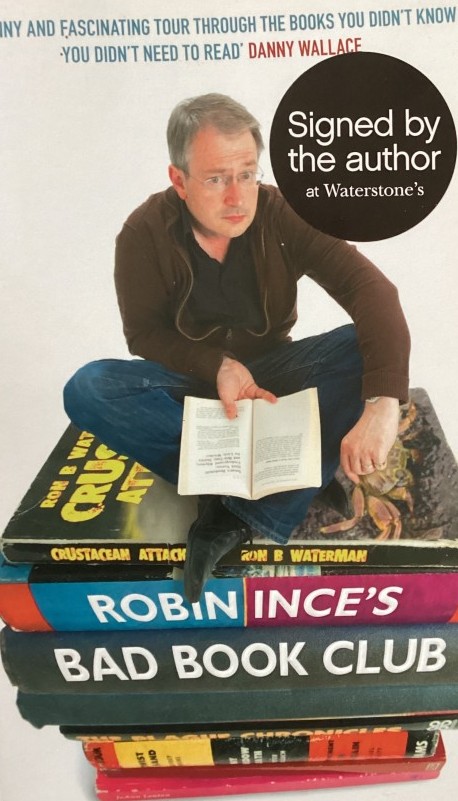Inspiring Older Readers
 posted on 13 Apr 2023
posted on 13 Apr 2023
Bad Book Club by Robin Ince
Back in late 2022 when I reviewed Robin Ince’s amiable confessional, Bibliomaniac, I noted then that:
“I have to be honest and say that we don’t share a taste in books: who on Earth could compete with Ince for his range of reading? He has a love for the bizarre, for horror and science fiction curiosities, for biographies of minor celebrities, for popular and even obscure science.”
What I didn’t know then was that back in 2010, Ince had written a more detailed – and often extremely funny – analysis of the screamingly awful ‘good bad books’ he’s been accumulating over five years or so. He gathers them in from all sorts of places but this ‘club’ of one has some basic rules:
“I’ve had to impose rules along the way….For a book to make it into this scattergun collection, it had to be purchased by me in a second-hand shop for less than £3, or to have been donated by a fellow enthusiast, or to have been found in a skip or on a train seat. It cannot be purchased at full price, bought from a pulp book internet specialist, or made up for the hell of it.”
In order to guide us through this extraordinary collection of books that it’s almost impossible to believe exist, Ince splits them into eleven broad categories – sex, autobiography, bad science, new age, horror etc. Some, naturally, work better than others – but this may be a judgement based on my own interests/tastes.
The section given over to ‘Autobiography’ is focussed on the incredible tonnage of celebrity memoirs. Even this section has to have some rules – he avoids those that have been ghost written and dives headlong into ones where the celeb. has decided to actually write their own book. There are some very funny moments here but, to be honest, it is a bit like shooting fish in a barrel – if you’ve got the tenacity to actually read any of this stuff then I think the laughs almost come along of their own volition.
I do, however, think that the sections given over to ‘Bad Science’ and ‘New Age’ whilst irresistibly funny, have behind them a more unsettling reality – people bought these books because they were prepared to take them seriously. Books about alien visitations, UFOs, yogic travellers and the like make extraordinary claims that dissolve and become risible under any sort of scrutiny but have made fortunes for the likes of Erich von Daniken. And, sadly, this is the stuff that has spawned whole television channels dedicated to the notion that there have been alien visitors who have shaped humanity’s destiny and there are people out there who ardently believe this bad science.
The same unsettling feeling exists around the examples of ‘New Age’ literature that Ince turns up – belief in ghosts, crystals, psychic readings are amusingly dissected but there’s always the lurking suspicion that this stuff isn’t as marginal and fringe as it should be.
The section on ‘Columnists’ is really there to allow Ince to launch a hatchet job on the right-wing ranters, Garry Bushell, Melanie Phillips, Richard Littlejohn and Peter Hitchens. It will, of course, depend on your politics just how funny and gloriously acidic you find this but, if you’re broadly in sympathy with any of these journalists, Ince’s book is probably one to avoid.
Ince’s addiction to the ‘good bad book’ was triggered by two random events – he found himself completely captured by the detailed and explicit absurdity of The Stag Movie Review that he found on the bookshelf of a charity shop and then, trapped in a holiday house in terrible weather, he found himself entranced by an excruciatingly dreadful Mills & Boon romance. This experience should be a warning to all of us who obsessively trawl for second-hand books: there are things out there that can seduce you that are not all creative and literary and if you give in once or twice there may be no way back.
The book is available for well under £10 and if you are even remotely familiar with the kind of dreck that washes up in charity bookshops, you'll find this irresistible.
Terry Potter
April 2023